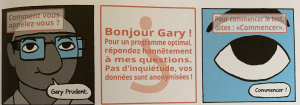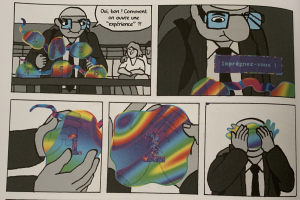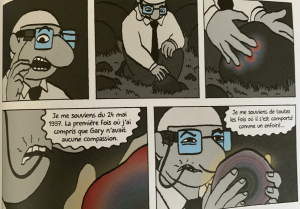From time to time, you bump into a very very interesting imaginary that literally immerses you in what the future could look like. This is exactly what happens with the Comics from Robin Cousin, and more precisely with « Le profil de Jean Melville ». We will not spoil the end of the story (which, to our knowledge, is only available in French unfortunately), but we would like to discuss the usage that the author makes of a kind of Google Glasses (named “Jimini” in the comic). The whole comic is drawn in black and white, aside of the glasses themselves and everything that happens that is linked to them. This narrative trick is nice and helps us dive more easily into the potential and issues of these type of glasses if they were to become a standard.
So, the hero, who is a P.I, is one of the few people not willing to put on these glasses. He nevertheless has to do it because one of his client is … the producer of the glasses. What happens when he logs on for the first time is exactly what you would expect : a series of questions in order for the massive AI which is being the glasses to adapt itself to your needs. Exactly the same ritual as stated in the famous discovery scene in “Her”. In fact, it even kindly asks you to be honest in order to perform well. This raises the first of numerous ethical questions and how you might want to « hack » that very beginning in order to enjoy part of the services without having to share everything with a machine and the people behind it. Also, it highlights a strange relationship in terms of power, one of a device asking a kind of dumb question to the human counter-side in order to filter its psyche. It looks like a way to learn, but it is a reverse situation : the AI performs with the human as a Professor would do with a little child. By repeating exactly what the AI is asking, it is setting a power relationship with you at the lower stage.

The setup phase
After that, the glasses basically transform into a super coach, offering advices for anything in life, from how fast you are supposed to be able to run, to how you should behave while facing such and such person. From this point of view, the comic offers a very interesting and critical view that we can see in design fiction. What is absolutely fascinating in this strip is the drawing “à la ligne claire”, like in Tintin or other realistic stories. The issues that are raised appear rather obvious, but at the same time, absolutely mundane.

The glasses of course offer navigation assistance in the city or elsewhere, and any other thing we could think of right now (want to find and book a restaurant ? Here we go !). What is really interesting is to see how easily someone who was resisting to the usage of these glasses is using them in a very mundane way. We could say that everything in it is made specifically to infiltrate itself into people’s lives and easing it. This raises numerous questions when the hero chats with people who are not equipped or even more, with people who are equipped : what happens when the same AI is facing itself in its recommendations. Will it tell something to the person A that will be in conflict with the person B’s AI (which is the same AI…) ?
Just as if the comic wasn’t already good enough, the author shows the reader how you can find someone in the mass of anonymized data, simply by asking a set of question that will help narrowing down the number of users to a few. This basically is as easy as asking to « narrow to men, narrow to people who have logged on this and this website, to people who are fan of this sport and to people who are single and live in this city ». And here you go, you have a nice shortlist of a few (still anonymized though) users who might be the person you are looking for.
Finally, and this is a very sweet hypothesis, the comic presents how a group of hackers (chaos computer club; reminds of you of something ?) hacks the machine in order to be able to put the AI aside and provide live experiences through the glasses. This is done with a nice interaction : geolocating an experience, seizing it with your hands and splashing it over your face. They will even provide you with a synesthetic experience if you are willing to bite a cable.

“Opening” an experience by physically grabbing it in the virtual space and pasting it on your face

A synesthetic experience !
To put it in a nutshell, Robin Cousin is providing us with a very insightful vision of a mundane world where Google Glasses like technologies are available. He clearly shows the most common fears and threats about these kind of device, and is able to invent creative ways to create new families of experience. An absolute must read.

